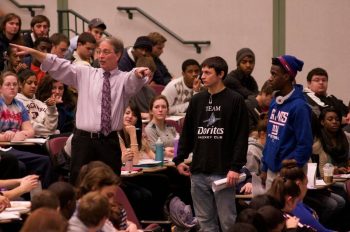Let’s talk about how a college course becomes an award- winning television program — if for no other reason than the public education system already has the market cornered on how a bill becomes a law.
It’s been a bountiful year for central Pennsylvania’s own WPSU. The State College-based television station walked away from the 2016 Mid-Atlantic Emmy Awards with two new golden tchotchkes to add to the mantelpiece.
Accounting for at least half of that coveted space is the Education/Schools Emmy that “You Can’t Say That” received in the Program/Special category.
In approximately 27 minutes, the short feature succeeds where so many others have failed — finding a seat inside of a lecture hall already packed to the brim with well more than 700 Penn State students.
It’s a heck of a crowd for an elective class on race and cultural relations and most of the credit for that belongs to Sam Richards, a self-described iconoclast from Toledo, Ohio.
Richards has made a name for himself confronting topics head-on that others would rather let pass quietly into that good night. He’s funny, insightful, provocative — your favorite teacher in high school given carte blanche.
And for one bright, shiny moment there, he was almost the star of his own ongoing television series.
Jeff Hughes, the executive producer of “You Can’t Say That,” heard about Richards’ class and immediately recognized the potential.
“Students talked of how it challenged their beliefs and often changed their perspectives on race and diversity. We thought it would be really cool to give the viewer an opportunity to go back to school and sit in on the lecture and group discussions,” Hughes said.
Ah, yes, the discussion sections.
Richards’ 700-plus person class is typically broken down into approximately 52 smaller groups that are administered to by 34 teaching assistants operating under the watchful eye of one very involved Laurie Mulvey, who also happens to be Richards’ wife.
If that sounds a trifle cumbersome, bear in mind that complex problems often have multifarious solutions. Almost nobody knows this better than a television producer.
Lindsey Whissel Fenton, the project’s producer, attended several of Richards’ lectures to determine how the course would translate to the small screen.
“It was very exciting to get to watch that process and to get to share it through the program,” Whissel Fenton said.
One of the earliest examples of Richards’ approach occurs within the first four minutes of the program, when the sociologist asked a student volunteer — a young Caucasian female — to peruse a lineup of three Asian men standing patiently at the front of the hall and declare which one that she found most attractive.
The notion was to examine how our conception of beauty has been filtered through an almost entirely white lens.
“We learn not to see race but I say no, let’s see it, let’s talk about it,” Richards said.
He wants to get students talking, questioning the “how” and “why” of the way they view the world. This requires a leap of faith on both sides of the equation.
The discussion portions of the course, blocks of which have been edited throughout “You Can’t Say That,” are an opportunity for students to process their reaction to the material.
“It really involves trusting people to learn. I’ve had everything from tears, yelling …,” Mulvey said.
How that delicately balanced atmosphere might be misperceived or changed by the subjective eye of the camera was initially a source of concern to Richards and Mulvey.
There was nothing to hide. What happens in Vegas doesn’t actually stay in Vegas — it’s just much easier to understand if you’re already along for the ride.
Hughes also realized that the potentially disruptive presence of the production team could snuff the very spark they were looking to capture.
As much as we tried to keep our presence to a minimum, I’m sure that it was a challenge to Sam and the class to not let the cameras and crew affect the dynamic in the room. Authentic conversation and discussion are the most critical element of the course,” Hughes said.
That challenge may have brought out the best in Richards and Mulvey, who upon reflection allowed the most effective and engaging elements of their course to rise to the top.
It’s the same mercenary quality that is found in the very best of performers, the ability to ruthlessly cull the weaker elements of an act so that the strong may survive and flourish into perpetuity.
“I’m definitely a way better teacher and the class is way more interactive,” Richards said.
After funding fell short, what was once envisioned as the pilot of an ongoing series was eventually repacked as a stand-alone program.
Hughes and Whissel Fenton both feel like they accomplished what they set out to do.
“The pilot was something to be proud of and could potentially impact a lot of people,” Whissel Fenton said.
Also, they have an Emmy now.
Article posted from the Centre Daily Times
